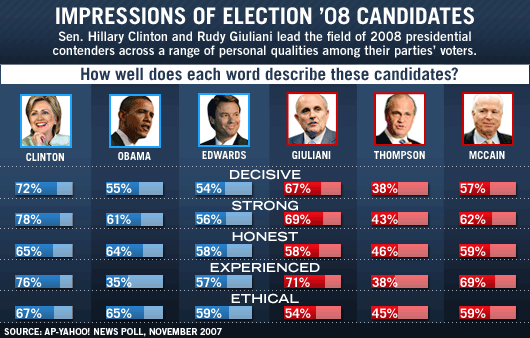By Michael Perry
SYDNEY (Reuters) - Australians began voting on Saturday in national elections to decide whether to end more than 11 years of conservative rule or give Prime Minister John Howard, who trails in opinion polls, a fifth term.
"Its in the hands of the people," Howard said as he took his morning walk from his Sydney Harbor-side residence.
Howard, 68, again warned voters that if they elected a Labor government it would threaten Australia's economic prosperity.
"The government to be chosen today will set the direction of the country for years into the future," Howard said on YouTube Web site, in a pitch to young voters he has struggled to woo.
"So if you think the country is heading in the right direction don't risk that right direction by changing the government," he said.
Howard, a staunch U.S. ally, has made a commitment to keep Australian troops in Iraq if re-elected. He has offered voters A$34 billion ($29 billion) in tax cuts, but few new policies.
In contrast, opposition Labor leader Kevin Rudd has pledged to withdraw combat troops from Iraq and sign the Kyoto Protocol on global warming, further isolating Washington on both. The Mandarin-speaking former diplomat would also be expected to forge closer ties with China and other Asian nations.
Rudd, 50, a Mandarin-speaking former diplomat, has promised generational change for Australians, an "education revolution" boosting IT skills in schools and reform of health and controversial labor laws championed by Howard. (Nov 22 Reuters)
An Australian commando died fighting the Taliban on Friday, the third soldier killed in recent months in Afghanistan.
Both Howard and Rudd want to keep troops in Afghanistan, but opinion polls show Australians opposed to operations in both Iraq and Afghanistan, and are losing faith in Howard's tough security stance, which has won him previous elections.
Howard has been written off by opinion polls throughout the six-week campaign, with some predicting a landslide win for Rudd, after only 11 months as party leader. But a Newspoll on Saturday had Labor only slightly in front.
Howard risks becoming the first prime minister to lose his own seat in an election for 78 years. Boundary changes have turned his blue-ribbon Sydney electorate, which he has held since entering parliament in 1974, into a marginal seat.
"LAZARUS"
Many voters of Asian origin see Howard as anti-immigration, due to his tough stance against boat people. An anti-Muslim leaflet distributed by his party in the closing days of the campaign may reinforce their belief.
Labor needs to win an extra 16 seats to take office and both Howard and Rudd say the election will be very close, possibly decided in a handful of marginal seats.
Howard once described himself as "Lazarus with a triple bypass" for his ability to be resurrected from political defeat. Even if he wins it will be his last hurrah, as he has promised to step down mid-term for his treasurer, Peter Costello.
Rudd, 50, is offering voters a generational change, saying Howard is too old and tired to lead Australia.
"I offer Australia new leadership for the future, a positive plan for the future because Mr Howard's government's best days now lay behind it," Rudd said on Friday. "Mr Howard has gone stale in his government's approach to the future."
Howard has attacked Rudd's lack of experience, insisting that a Labor government dominated by former trade unionists would wreck an economy which has recorded 17 years of growth and record unemployment.
He says that under his tenure, dominated by security and the economy, Australia has become more secure and stable.
Since the September 11, 2001 attacks in the United States, Australia has been on medium security alert. Australia's military in 2006 was at its highest operational level since the Vietnam War, with troops in Iraq and Afghanistan and elsewhere.
(Editing by Andrew Roche)
